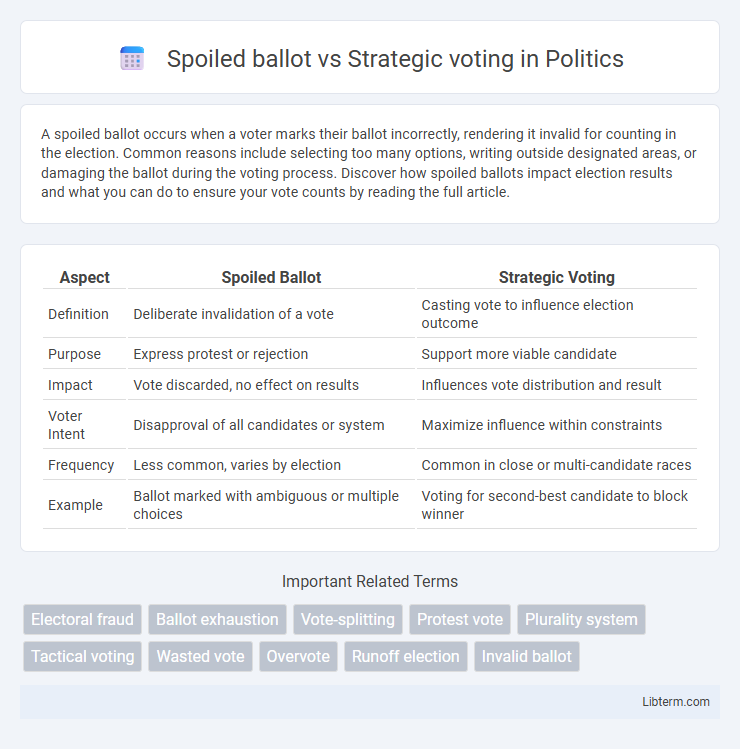A spoiled ballot occurs when a voter marks their ballot incorrectly, rendering it invalid for counting in the election. Common reasons include selecting too many options, writing outside designated areas, or damaging the ballot during the voting process. Discover how spoiled ballots impact election results and what you can do to ensure your vote counts by reading the full article.
Table of Comparison
| Aspect | Spoiled Ballot | Strategic Voting |
|---|---|---|
| Definition | Deliberate invalidation of a vote | Casting vote to influence election outcome |
| Purpose | Express protest or rejection | Support more viable candidate |
| Impact | Vote discarded, no effect on results | Influences vote distribution and result |
| Voter Intent | Disapproval of all candidates or system | Maximize influence within constraints |
| Frequency | Less common, varies by election | Common in close or multi-candidate races |
| Example | Ballot marked with ambiguous or multiple choices | Voting for second-best candidate to block winner |
Understanding Spoiled Ballots: Definition and Causes
Spoiled ballots are voting papers that are intentionally or unintentionally marked incorrectly, rendering them invalid in election counts; causes include voter errors, confusion over instructions, or deliberate protest votes. This contrasts with strategic voting, where voters select a candidate they perceive as having a better chance of winning rather than their true preference, aiming to influence the election outcome. Understanding the high incidence of spoiled ballots in contexts with complex ballot designs or ambiguous voting instructions is crucial for election officials to improve voter education and ballot clarity.
Strategic Voting: Concept and Importance
Strategic voting involves casting a ballot not for the preferred candidate but for a less favored candidate with a better chance of winning, aiming to prevent an undesirable outcome. This behavior plays a crucial role in electoral systems by influencing candidate viability and overall election dynamics. Understanding strategic voting helps explain voter behavior patterns and the impact on democratic representation.
Key Differences Between Spoiled Ballots and Strategic Votes
Spoiled ballots occur when a voter intentionally or unintentionally invalidates their vote by marking it incorrectly or leaving it blank, resulting in the ballot being discarded during counting. Strategic voting involves selecting a candidate other than the voter's true preference to influence the election outcome, often to prevent an undesirable candidate from winning. The key difference lies in intent: spoiled ballots reflect voter confusion or protest with no impact on results, while strategic votes are calculated decisions aimed at maximizing electoral influence.
Psychological Factors Behind Spoiling Ballots
Psychological factors influencing spoiled ballots include voter confusion, protest behavior, and cognitive dissonance arising from dissatisfaction with available candidates. Spoiling a ballot often serves as a symbolic act to express disillusionment or opposition without endorsing any option, reflecting a psychological need for political voice and identity affirmation. This contrasts with strategic voting, where voters deliberately choose a less preferred but more viable candidate to avoid wasting their vote, driven by rational evaluation of electoral outcomes rather than emotional responses.
When and Why Voters Choose Strategic Voting
Voters choose strategic voting primarily when their preferred candidate has little chance of winning, aiming to prevent an undesirable candidate from securing victory in elections. This behavior often occurs in plurality voting systems where vote splitting can lead to the election of a less favored candidate. Unlike spoiled ballots, which result from voter error or protest, strategic voting is a deliberate choice to maximize electoral influence and impact policy outcomes.
Impacts of Spoiled Ballots on Election Outcomes
Spoiled ballots dilute the total vote count, potentially altering election outcomes by reducing the effective votes for candidates, especially in close races. They can skew the perceived voter turnout and misrepresent true voter preferences, undermining the legitimacy of the election results. High rates of spoiled ballots may prompt electoral authorities to review ballot design and voter education to minimize errors and maintain election integrity.
Effects of Strategic Voting on Political Representation
Strategic voting can lead to distorted political representation by encouraging voters to support less-preferred but more viable candidates, which often marginalizes smaller parties and limits the diversity of political viewpoints in elected bodies. This behavior contrasts with spoiled ballots, which are generally discarded and do not influence election outcomes, whereas strategic votes actively shape election results and political power distribution. The prevalence of strategic voting tends to reinforce a two-party system, reducing the political representation of minority groups and skewing policy priorities toward dominant parties.
Legal and Procedural Aspects of Spoiled Ballots
Spoiled ballots, which are invalidated due to voter errors or improper marks, are governed by strict legal and procedural frameworks designed to maintain election integrity and transparency. Election laws typically define the criteria for spoiled ballots, including unclear markings, multiple selections where prohibited, or damage to the ballot, ensuring consistent treatment during the counting process. Unlike strategic voting, where voters deliberately choose a less-preferred candidate to influence outcomes, spoiled ballots are unintentional or protest votes that do not count toward any candidate, often prompting legal scrutiny to prevent disenfranchisement.
Ethical Implications of Strategic Voting
Strategic voting raises ethical concerns as it involves voters choosing candidates not based on genuine preference but to influence election outcomes, potentially distorting true democratic representation. Unlike spoiled ballots, which invalidate votes, strategic voting manipulates electoral processes by prioritizing pragmatism over sincerity, challenging the principle of honest voting. Ethical debates focus on whether strategic voting undermines voter integrity or serves as a necessary adaptation within flawed electoral systems.
Reducing Spoiled Ballots and Encouraging Informed Voting
Reducing spoiled ballots requires clear instructions and user-friendly ballots to minimize voter errors and confusion during elections. Encouraging informed voting involves widespread voter education campaigns that provide comprehensive information on candidates and issues, enhancing decision-making confidence. Combining these strategies improves electoral integrity by ensuring more valid ballots and fostering responsible voter participation.
Spoiled ballot Infographic

 libterm.com
libterm.com